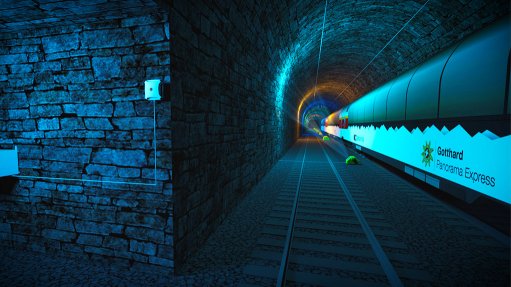
The Gotthard tunnel in Switzerland
Johannesburg-based Poynting Group is seeking to expand its business to the rest of the Africa, says CEO Michael Howard.
Poynting is already well known outside Africa, with 50% of its revenue flowing from Europe, the US, Australia and Scandinavia. Manufacturing is based in Midrand and China, with the latter market providing faster access to Europe.
Product development and innovation are centered solely in South Africa.
Poynting holds more than 50 registered designs and patents in various countries across the globe.
“In Sub-Saharan Africa, our focus includes providing Internet access to Africa using our antenna products,” explains Howard.
“We are putting together an African business model where we partner with stakeholders which provide added value in the fixed wireless eco-system, where fibre does not reach or does not perform.
“This includes partners such as the mobile and fixed operators, financial services and installation partners.
“This will mean that Poynting will not only sell antennas, but also the router, the sim card, airtime packages and installations, while also providing finance over a contract period.
“We plan to deploy the model in sub-Saharan Africa.”
Howard says this will not place Poynting in competition with mobile operators, as Poynting will also sell mobile operator services.
The R100-million-a-year, 17-year-old company has already opened an office in Botswana, with a launch planned for later this year.
Howard says the Botswana networks are a few years behind South Africa in terms of its telecommunications infrastructure, with around 80% of the networks still evolving from 2G.
“For us, this is where we have been successful in the past. We have done all of this before in South Africa.”
Worldwide Success
Recent successes for Poynting outside South Africa include installations in the Gotthard Base Tunnel, the world’s longest and deepest train tunnel through the Swiss Alps.
This tunnel makes use of antenna technology from Poynting Antennas (the XPOL 2 v2) to ensure a seamless digital communication service underground, over a route length of more than 57 km.
In Norway, the Norwegian Air Ambulance Foundation uses data supplied from remote weather stations, equipped with Poynting antennas, to ensure safe flying.
“Poynting antennas are considered premium products in Europe,” says Howard.
The company’s business in South Africa has grown through the hunger for quick and improved Internet access, as well as the rather surprising success of a security solution for back-up batteries at mobile base stations.
“The DC power provision and protection solution for base station sites is built around Poynting’s highly acclaimed MagiCube secure concrete enclosure, finding adoption among mobile operators in Southern Africa” explains Howard. “The enclosure business is fast becoming an important part of our business.”
Poynting, through its partners, also produces small, foldable digital television antennas for the South African government-assisted programme to deploy terrestrial digital television.
The Future
“The future of antennas is filled with opportunity,” notes Howard.
“5G is coming, which means we’ll see higher internet speeds and the deployment of more, but smaller base stations to cater for increased capacity. These base stations will be smaller than a briefcase, for example.
“5G requires antenna systems that are more complex than we currently use today with 3G/4G. As networks evolve towards 5G, we see opportunity in developing new products that complement the use of higher frequencies together with smaller cells (base stations) in pursuit of the higher speeds and capacity that 5G technology offers.
“We’ll continue to stay on the curve of antenna innovation as antenna and telecom technology evolves,” says Howard.
Poynting Antennas employs around 50 people in South Africa.